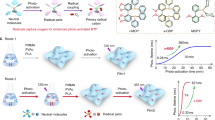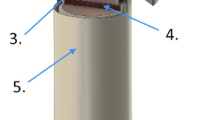Abstract
AN apparatus has been developed for measuring quantitatively, by counting, the distribution of radioactivity on filter paper chromatograms. The specific purpose in view has been to measure the amounts of radioactive phosphorus present in various phosphate esters as separated on filter paper chromatograms by the methods described recently by Hanes and Isherwood1.
This is a preview of subscription content, access via your institution
Access options
Subscribe to this journal
Receive 51 print issues and online access
$199.00 per year
only $3.90 per issue
Buy this article
- Purchase on SpringerLink
- Instant access to the full article PDF.
USD 39.95
Prices may be subject to local taxes which are calculated during checkout
Similar content being viewed by others
References
Hanes, C. S., and Isherwood, Nature, 164, 1107 (1949).
Atkinson, H. F., Nature, 164, 541 (1949).
Bourne, G. H., Nature, 163, 923 (1949).
Tomarelli, R. M., and Florey, K., Science, 107, 630 (1948).
Putman, J. L., and Boxall, R. H., Brit. J. Radiol., 20, 190 (1947).
Author information
Authors and Affiliations
Rights and permissions
About this article
Cite this article
BOURSNELL, J. A Radioactivity ‘Scanning’ Device for Paper Chromatograms using Phosphorus-32. Nature 165, 399 (1950). https://doi.org/10.1038/165399a0
Issue date:
DOI: https://doi.org/10.1038/165399a0



